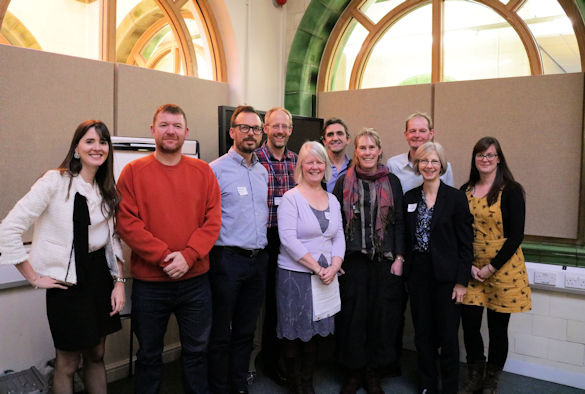
L-R: Sara Ronzi, Roy, Professor David Taylor-Robinson, Dr Paul Atkinson, Dr Sue Povall, Stephen McGann, Prue Thimbleby, Daniel Morden, Professor Sally Sheard, Dr Sophie Wickham
This week (Tuesday, 29 October), the University played host to the first ‘Liverpool Health Stories’ event, funded by the Wellcome Trust, which highlighted the use of storytelling to help raise awareness of key concepts in public health.
Organised and supported by the University’s Department of Public Health and Policy, and The Centre for Humanities and Social Science of Health, Medicine and Technology, the event explored the use of stories and storytelling to communicate complex ideas commonly used within academic public health as well as the use of stories to communicate the findings from research.
The day featured talks from the research team and guest speakers including actor and author Stephen McGann, Welsh oral storyteller Daniel Morden, community storyteller Prue Thimbleby, and Liverpool storyteller ‘Roy’.
Social circumstances and political decisions
Stephen McGann talked about his book ‘Flesh and blood: a history of my family in seven maladies’. He powerfully illustrated the links between social circumstances, shaped by political decisions and power structures, and health outcomes. Stephen demonstrated how the Irish potato famine had a direct impact on his ancestors who arrived in Liverpool in the mid-19th Century. The excruciating hunger they experienced in Ireland was reflected poignantly in the hunger they endured living in the slums of Liverpool. He also shared a very moving story about his mother’s experience of the stillbirth of her twin boys in the 1950s
Daniel Morden demonstrated how internal social worlds can affect an individual’s response to serious illness. An international storyteller of 30 years, Daniel illustrated through powerful prose how the stories he knew gave him the strength to face the existential threat of a rare cancer in his jaw. The stories gave him a pathway through this journey, enabling him to connect deeply with others who have experienced such depths of personal crisis. Importantly, the stories sustained him and helped him find a new vision for how his life can be beyond cancer.
Inspiring change
Liverpool storyteller, Roy, read some of the stories he has composed based on his life, the lives of his friends and family, and poetry. These were not autobiographical stories. Rather they revealed emotions and experiences that would be familiar to people not at the forefront of public consciousness. The stories revealed the ever present multiple worlds living cheek by jowl in the same geography. Reflecting, both the external determinants of wellbeing and internal responses to those challenges, Roy’s stories reminded the audience, with wit and vivid imagery, that there are many people today who face challenges the comfortable middle classes may not be able relate to.
Prue Thimbleby brought the event to a close by describing the work she has been doing with Swansea Bay Health Board to capture biographical stories with the purpose of inspiring change in the delivery of health, social care and public health in Wales. These stories are turned into digital stories – short videos using the patient or staff voice, illustrated with photographs or pictures. Prue shared some of the stories she has made, which were challenging, emotional and beautiful. She also described the process of creating these stories as we hope to use this technique to develop public health digital stories to illuminate and illustrate key public health messages in Liverpool.
Each of the presentations, and a final panel with the guest speakers, drew valuable stories and discussion from the audience.
Fascinating and heartfelt
Professor Sally Sheard, Head of the Department of Public Health and Policy, said: “For thousands of years stories have been used to pass on learning and knowledge. An interesting story can help engage our curiosity, emotions and imagination.
“Public health practitioners aim to improve quality of life through understanding the ways in which our social, economic and cultural worlds impact on our health in terms of disease and mental health.
“Our event began the much-needed conversation on how storytelling might be used within public health. It was a fascinating, heartfelt and at times, heart breaking, exploration of people’s personal health stories and the support and compassion that people displayed towards each other was incredibly moving.
“I would like to thank the all of the participants who helped to make the event a rousing success. This is the beginning of an exciting collaboration with fellow Liverpudlians about what determines our health and health inequalities. We plan to provide training and support in 2020 for people who wish to become health storytellers.”